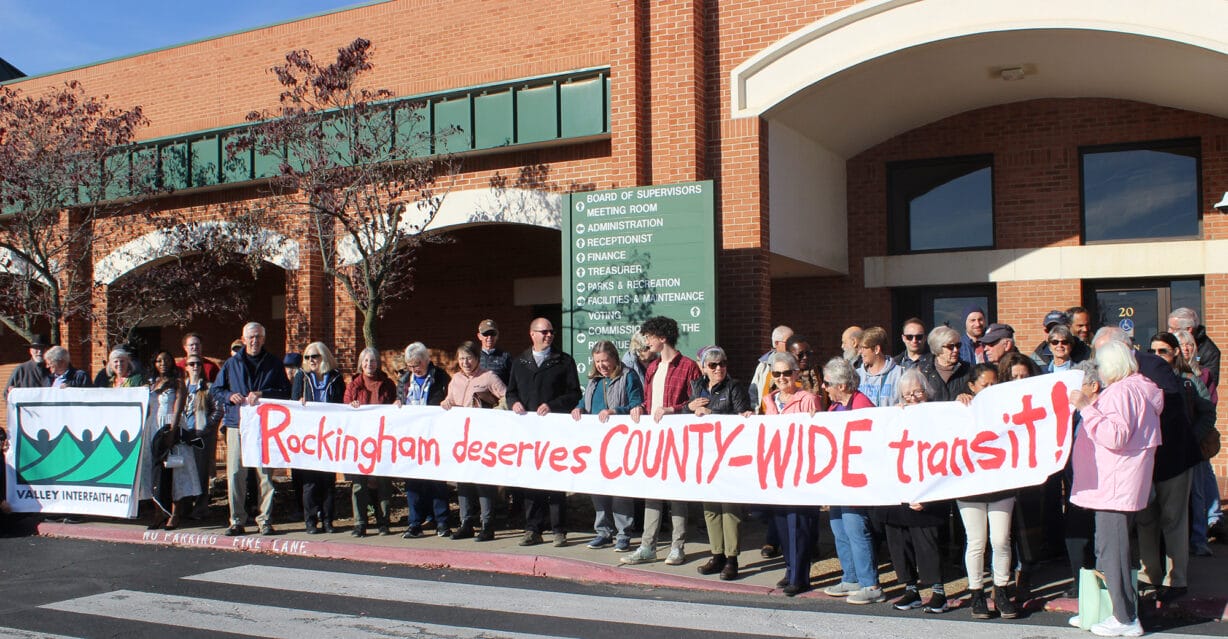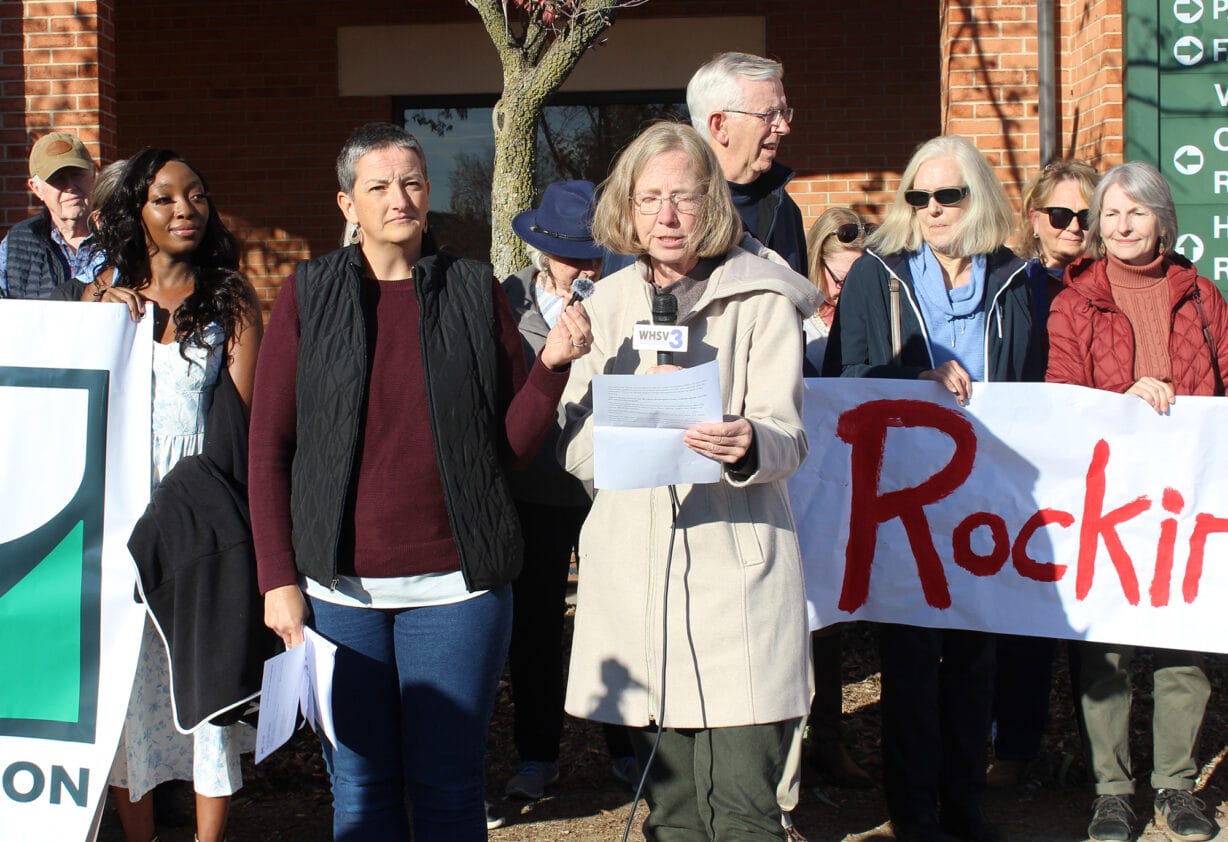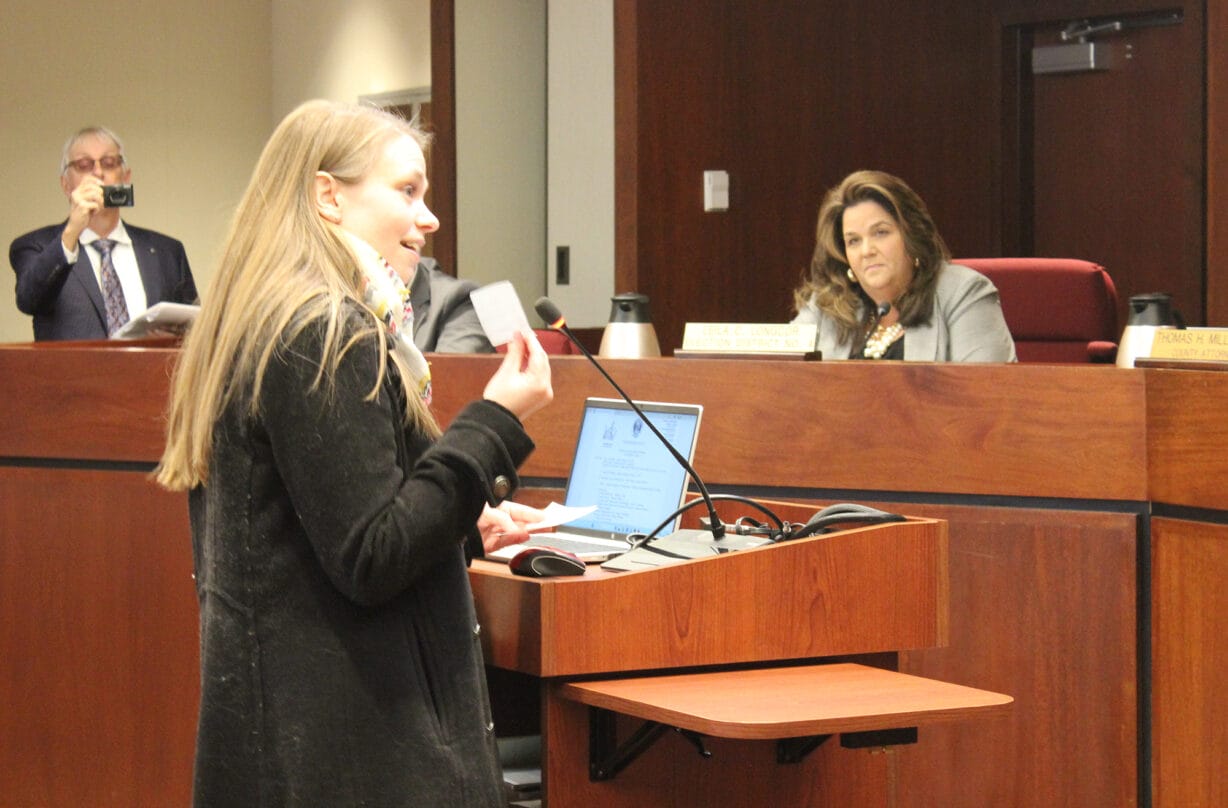
By Bridget Manley, publisher
More than 100 members of Valley Interfaith Action (VIA) presented the Rockingham County Board of Supervisors with a surprise $200,000 check Wednesday in an effort to secure funding for a countywide door-to-door public transportation service.
The group, which represents about 10,000 residents in Rockingham County and Harrisonburg, made the presentation during the supervisors’ monthly meeting in downtown Harrisonburg, following a press conference outside the building where they made their appeal.
The supervisors didn’t comment on the group’s proposal and said they couldn’t accept the check.
VIA has spent more than two years working to develop a plan to address the county’s transportation issues. The proposed service would be operated by a state-certified transit provider and be available to all residents of Rockingham and Harrisonburg. Riders would be able to make reservations up to 24 hours in advance for transportation to, from, or within the county.
To move forward with the plan and secure state funding, VIA needed to raise $200,000 in matching funds, which would help leverage an additional $800,000 in state and federal money. A letter of support from the Rockingham County Board of Supervisors is also required for the Virginia Department of Rail and Public Transportation to approve the pilot project.
Ann Petit, co-pastor of Massanutten Presbyterian Church, said VIA formally asked the supervisors for a letter of support in January. In a 4-1 vote, the supervisors denied the request until the group could secure the necessary funds.
Petit said VIA worked to raise the funds, but the supervisors later issued a letter of support for another transportation project, backed by the Augusta County-based Alliance Committed to Improving Our Neighborhoods (ACTION).

VIA claims that ACTION’s proposed service, which would cover only the Dayton-Bridgewater corridor, would cost five times as much as VIA’s plan and rely on an “Uber-like” model.
“The supervisors didn’t question ACTION’s plan or require matching funds, but they didn’t offer us the same opportunity,” Petit said. “Despite many conversations with them, they never shared this information with us, nor did they suggest a larger discussion to evaluate both proposals.”
Petit said that the supervisors had been given the opportunity to support the entire county but instead voted on a proposal that excluded localities such as Elkton, Grottoes, Singers Glen, and Bergton.
Rockingham County conducted a transportation feasibility study, which was presented to the Board of Supervisors in January.
The study, conducted by Kimley-Horn and overseen by representatives from the Virginia Department of Rail and Public Transportation (DRPT), Rockingham County, the Central Shenandoah Planning District Commission, and VIA, recommended the transportation plan that the county voted to support.
The study considered two models: Software as a Service (SaaS) and Transportation as a Service (TaaS).
The SaaS microtransit model would require a third-party vendor to supply the software for dispatching and overall management, but it would use an existing fleet of vehicles and drivers. Under the TaaS model, the county would contract the entire operation to a third-party provider, including software, operations, maintenance, and vehicle management.
The study recommended a pilot program using the TaaS model in the Dayton/Bridgewater corridor because that area has the largest concentration of employment centers and riders. The project team determined that this zone would offer the most critical measures of success for proving the concept.
While the TaaS model would be more expensive to implement, the study noted that the county would not assume any risk related to operations or vehicle acquisition during the pilot program. It also suggested that if long-term microtransit proved successful, the county might consider transitioning to the SaaS model due to reduced costs.
Pastor Fernando Ziata with Redemption Rehoboth Tabernacle said that many members of the Tabernacle work at poultry plants, hospitals, warehouses, and long-term care facilities and need public transportation to get to work every day.
“Because of them, our economy is strong, and our community thrives,” Ziata said. “And yet, my people struggle to get to the doctors, to get to work, to get to the grocery store, and go learn English. A lot of my members have lost a job because they couldn’t get to work.”

William Kent Carneal, a member of VIA and a representative of Otterbein United Methodist Church, called on Supervisor Joel Hensley to meet with the group.
“Supervisor Hensley, you said to come back when we had the money in hand. Well, here we are,” Carneal said. “We have the money, and yet you’ve refused to meet with us. You haven’t returned our calls or emails. That, sir, is disrespectful.”
While services such as the Brite bus run through Rockingham County, connecting Staunton to Harrisonburg and making stops like Blue Ridge Community College, Rockingham County has no formal public transportation.
VIA says it needs the letter of support from the county supervisors by Feb. 1, 2025, for the state to move forward with the award.
Editors note: This article has been updated to include additional information about the feasibility study presented to the Board of Supervisors in January of this year.
Thanks for reading The Citizen, which won the Virginia Press Association’s 2022 News Sweepstakes award as the top online news site in Virginia. We’re independent. We’re local. We pay our contributors, and the money you give goes directly to the reporting. No overhead. No printing costs. Just facts, stories and context. We value your support.














